“The more I make my life, my well-being, my enlightenment, and my success primary, the farther I step from reality. Thus the hell-bound do not travel downward; they travel inward, cocooning themselves behind a mass of vanity, personal rights, religiosity, and defensiveness. Obsession with self is the defining mark of a disintegrating soul (italics mine)”
Jeff cook.[1]

There’s this moment, you know, when suddenly it hits you that your kids are actually “growing up.” It’s like someone flipped a switch and bam! Your once adorable little munchkin, blissfully oblivious to the craziness and danger in the world, gives you a sneak peek of “maturity.” It’s a mix of thrilling and terrifying.
As for me, picture this: a Christian homeschooling dad, doing his best to raise two little girls into future women of God, embracing a biblical worldview. Well, the day arrived not long ago when my eldest waltzed in for our homeschool session with her mom’s old smartphone snug in her back pocket. Oh, the joys of parenthood!
- Who is this?
- When did my little girl start acting like a “grownup?”
- Where did this come from?
- How did this happen?
These were questions racing through my mind as I stared at the phone hanging out of her little pocket. The next thought that surfaced was, I don’t like this!
Some of these feelings were no doubt the result of reading Jonathan Haidt’s recent book, The Anxious Generation, in which he contends a great “rewiring” of childhood that began in 2010 is the primary culprit for the rise in mental illness amongst children.
Who is Jonathan Haidt?
I’ve made it a habit of recent to always do some research on the authors I’m reading. I find it helps me better understand their perspective, bias, beliefs, etc. In his own words, Jonathan Haidt is “a social psychologist at New York University’s Stern School of Business. [His] mission is to use research on moral psychology to help people understand each other and to help important social institutions work better.“[ii] I also discovered in reading his book that he’s an atheist and believes in evolution. He is married to Jayne and has two children, a son and a daughter.
Haidt’s thesis is that “two trends – overprotection in the real world and underprotection in the virtual world – are the major reasons why children born after 1995 became the anxious generation.“[iii] This essay is a one-part summary of the book and one part about how Christian parents might use that data to be proactive in raising little ones who want to become grownups living out a biblical worldview.[iv] I begin with a detailed summary of the book, followed by what critics have said regarding Haidt’s research. I then finish with what I’ve learned and my advice for Christian parents raising children in the 21st century.
“The task of the Christian is not to whine about the moment in which he or she lives but to understand its problems and respond appropriately to them”
Carl Trueman.[v]
Also, note that my essay is quite detailed, with graphs, charts, and illustrations from the book. The text is nearly 400 pages, including over 60 pages of notes and references (not counting additional data available online). I’m presenting my highlights, notes, and comments here so that you don’t have to read the book, but nonetheless, I still highly recommend getting the book for yourself.
One of the initial aspects I appreciate about this book is Haidt’s approach of revealing essential pieces of advice early on, as opposed to withholding them until the conclusion, as some authors tend to do. In the opening pages, he presents four recommendations derived from his research. These recommendations encompass:
- No smartphones before high school.
- No social media before 16.
- Phone free schools.
- Far more unsupervised play and childhood independence.
The valuable aspect of these recommendations, as indicated by Haidt, is their minimal cost, and their effectiveness regardless of the support from elected officials. As a parent, particularly if you are a homeschool parent, you can implement all four of these suggestions with minimal effort. Even if your children attend government or privately operated schools, 1, 2, and 4 are still “free,” although they may not be as straightforward to execute.
Kids Just Want to Fit In
Think about what nearly all K-12 children desire, especially those attending school outside of the home. As someone who went to both private and public schools growing up in the 70s and 80s all I desired was to “fit in.” Like most kids still to this day, I wanted to “blend in” with the crowd. The desire to fit in shouldn’t be surprising since most forms of education seek to create conformity to a specified standard (i.e., fit in).
Alexis Spence supports this belief as she explained to Haidt why she was so eager to get an Instagram account in sixth grade despite her parents being against the idea.
“What made it so addictive was that I just wanted to fit in with my peers. I didn’t want to miss anything, because if I missed anything, then I was out of the loop, and if I was out of the loop, then kids would laugh at me or make fun of me for not understanding what was going on, and I didn’t want to be left out (bold mine).”
Alex Spence in interview with Jonathan Haidt.[vi]
The excerpt also highlights another challenge faced by parents of the Internet generation. It’s notable how often Alexis refers to herself (e.g., use of “I”). Social media is arguably contributing to the creation of a more narcissistic global population with an obsession with self.
Furthermore, John Taylor Gatto provides some additional insights into the challenges of education in his book, Dumbing us Down. Gatto, a prestigious 26-year public school teacher in New York (honored as the New York City Teacher of the Year in 1989, 1990, and 1991, and New York State Teacher of the Year in 1991), resigned abruptly in 1991 via an op-ed in the Wall Street Journal. Gatto succinctly articulates a related challenge stating, “Schools are intended to produce, through the application of formulas, formulaic human beings whose behavior can be predicted and controlled.“[vii] One could argue that most teachers aspire to cultivate classrooms of well-behaved children whose conduct aligns with a predictable standard. Who doesn’t want to teach in a classroom full of obedient children?
I mention this at the onset of my summary because children are being trained to conform – to look like one another – to meet an expectation that isn’t only academic but also social. The training is both deliberate and formal (e.g., in the classroom) and informal and social (e.g., relationships and observation of other children outside the classroom).
Imagine a child, better yet, your child, at school where everyone else has a smartphone and is on social media except her. How would this make your child feel? Words that come to mind are isolated, excluded, segregated, removed, and detached (i.e., just like Alex Spence described). I would argue the “solutions” Haidt lobbies for with (non-homeschooled) children creates a far greater challenge.
In a way I’m suggesting homeschool is a better approach, but that’s not the point of this essay. I want simply to suggest if your children are not homeschooled expect the smartphone war to be a series of battles with your children as they grow older and are surrounded by other kids staring at a screen.
Book Contents
The table of contents below illustrates the layout of the text. The author describes the contents as an explanation for the mental health trends in adolescents since 2010 (part 1); the nature of childhood and how we messed it up (part 2); the harms that result from the smartphone-based childhood (part 3); and what needs to be done to reverse the damage in families, schools, and society (part 4).
Note: Haidt provides all the documents (table of contents, figures, illustrations, etc.), data, helpful guides, chapter supplements, etc. here: https://www.anxiousgeneration.com/research
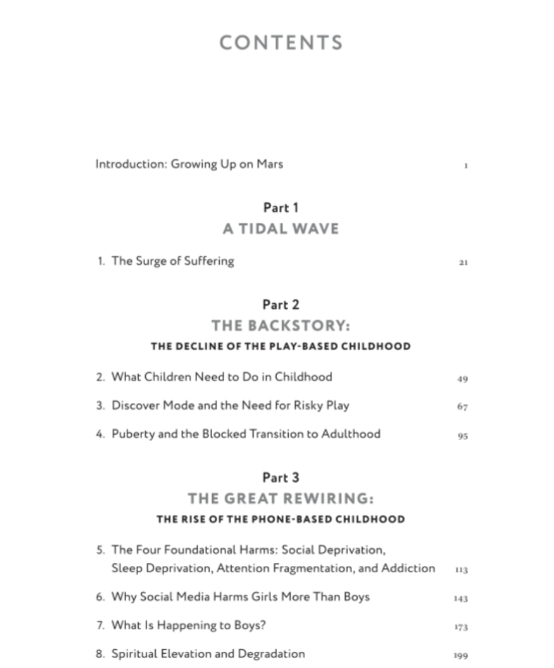
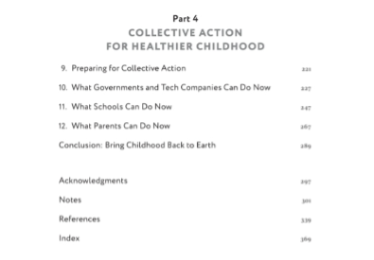
Part 1 | A Tidal Wave of Despair
Haidt begins by making a case for the connection between the decline in the mental well-being of teenagers coming of age in the 2000s, emphasizing a noticeable change in the data from 2010 onwards. Figure 1.1 demonstrates the increase in cases of major depression among adolescents. A significant shift began in 2010.
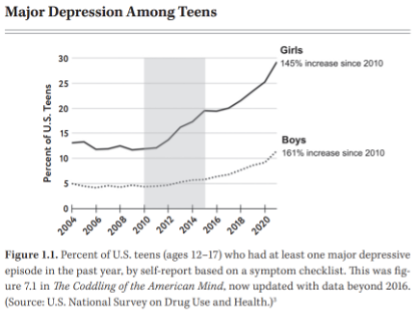
The above data, however, are “self-reported,” which can be less accurate since teens are assessing themselves. Nevertheless, a similar increase in self-harm by teens, something not as easily misreported or faked, also started to rise in 2009, as shown in Figure 1.4.

Moreover, suicide rates also rose sharply starting in 2007 (see Figure 1.5). I find the data for 10-14 year old children extremely disturbing. These are kids in 4th to 8th grade – middle schoolers. It’s mind blowing to think that a 10-year-old child could be in such a state of despair that they believe the only thing they can do is end their life.

Despair begins as a battle in the mind. The struggle can often lead a person to be unable to see beyond the present situation. I would argue that many children today lack hope. Hope is the opposite of despair. Hope is about expectation of what is yet to come. How you experience the present is dictated by your belief about the future.
This is often where a deep contrast between a secular and biblical worldview becomes quite evident as it relates to hope about the future. For the atheist (i.e., secular worldview) there is no hope. Life on earth is as good as it gets.
Alternatively, for the follower of Christ, this earthly life is the worst it will be. Everything in the future will be better than it is today. Hope is at the center of a Christian’s life, whereas for the atheist, hope lies in the present and a twofold “purpose” (I put this word in quotes because if life ends at death it has no purpose beyond the atheist’s imagination) to minimize personal pain and maximize personal pleasure. This is not, “Your best life now.”[viii]
“He will wipe away every tear from their eyes, and death shall be no more, neither shall there be mourning, nor crying, nor pain anymore, for the former things have passed away.”
Revelation 21:4
So, what happened around 2010? Why the sharp increases? Haidt argues, it was the introduction of the smartphone in 2007 that changed the lives of many people, especially for Generation Z (those born 1997-2012).
The Internet had been around for over a decade by 2010, and even social media (Facebook started in 2004), but what really changed was not that teens were online, but that now with a smartphone in their pocket they could be online all the time. Haidt reports that by 2016 79% of teens owned a smartphone and 28% of children 8-12 years old also had one.
Furthermore, Haidt cites Pew Research that found one of every four teens in 2015 were online “almost constantly,” and by 2022 the number had increased to 46%.[ix] Also worth noting in 2010 Apple’s iPhone 4 introduced us to the self-facing camera, the ultimate self-promoting technology of the 21st century.
Haidt concludes,
“. . . I refer to the period from 2010 to 2015 as the Great Rewiring of Childhood. Social patterns, role models, emotions, physical activity, and even sleep patterns were fundamentally reset, for adolescents, over the course of just five years. The daily life, consciousness, and social relationships of 13-year-olds with iPhones in 2013 (who were born in 2000) were profoundly different from those of 13-year-olds with flip phones in 2007 (who were born in 1994).“[x]
In summary, a significant rewiring began, and we are now reaping the consequences.
Part 2 | The End of Free Play & Discover Mode
Childhood in the 21st century has definitely changed, and as Haidt argues in part two, it has changed for the worse. One of the most significant changes is illustrated in Figure 2.1. Kids are spending less time with other kids. In 1991, around half of children hung out with their friends every day. Nearly 30 years later, however, the number is down to a third meeting each day. In a sense, kids are getting less social despite the rise in social media use.
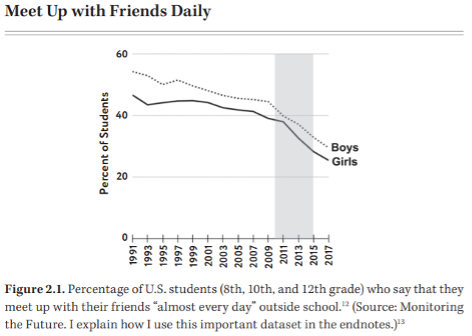
Moreover, when looking at the data in minutes per day (see Figure 5.1), a similar trend occurred, with a dramatic downward shift beginning in 2010. Nearly twenty years ago, 15 – 24-year-olds were spending almost two hours hanging out with friends every day, but in 2019, that time was less than half of what it was in 2003.
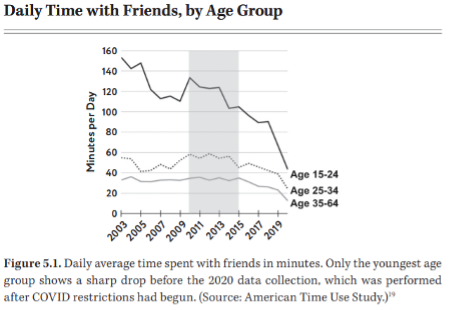
Haidt argues that kids are missing out on “free play,” a play that is freely chosen and directed by children with no specific goal. I can remember this type of play being central to my childhood—getting on my bike with no destination in mind, picking up a football and heading to the park, etc. The author suggests that today, parents, teachers, and coaches are too involved in kids’ playing. They can’t stop themselves from taking control and directing the kids.
I’m guilty of this, and you probably are as well if you’ve ever told your children, “Be careful,” “Don’t do that,” “Put that down,” etc. As Haidt suggests, “Experience, not information, is the key to emotional development. It is unsupervised, child-led play where children best learn to tolerate bruises, handle their emotions, read other children’s emotions, take turns, resolve conflicts, and play fair.“[xi] A simple way to apply this advice is to tell your children to “work it out” the next time they get into a disagreement.
Chronic social comparison is also something Haidt highlights that is adding to the rewiring of childhood. This is even a problem for children who don’t post anything on social media. They are still prone to comparing themselves to other children. Moreover, this plays a part in “social learning,” by copying others whom children follow online.
Again, this is the natural yearning for most children: they just want to conform (i.e., fit in) to the crowd. When I was growing up, we would refer to this as “peer pressure.” Once more, this furthers the argument that children educated in government or privately run schools could face more significant pressure to conform. As a homeschool dad, this perhaps is one of the greatest arguments for teaching at home – you are the greatest “influencer” in their life simply because you spend more time with them than anyone else.
“A disciple is not above his teacher, but everyone when he is fully trained will be like his teacher.” Luke 6:40
Moreover, as Haidt writes,
“Social media platforms are, therefore, the most efficient conformity engines ever invented. They can shape an adolescent’s mental models of acceptable behavior in a matter of hours, whereas parents can struggle unsuccessfully for years to get their children to sit up straight or stop whining. Parents don’t get to use the power of conformity bias, so they are often no match for the socializing power of social media.“[xii]
This, however, assumes that all or most social media influences are negative, which is obviously not always true. It does, however, point out that positive social media influencers could be a good thing for older children (e.g., 16+ years old) who are ready to responsibly handle social media.
Central to Haidt’s argument for not allowing younger children to have smartphones or partake in social media is that their brains are developing. Therefore, “Healthy brain development depends on getting the right experiences at the right age and in the right order.“[xiii] He cites research that suggests the worst years for using social media is 11 to 13 for girls, and 14 to 15 for boys, thus suggesting 13 (the legal age in the US) is too young for creating a social media account.
I resonate with Haidt’s two mindsets to which children have access based on how they are parented and treated by leaders in school. The mindset that is prevalent today, according to the author, is the “defend mode” mindset. Figure 3.1 outlines this mindset, something consistent with “helicopter parenting” (i.e., never letting your children do anything on their own).
Haidt argues, and this is one of his four leading suggestions, is that parents and educators need to take a step back and let kids live in “discover mode” more often. This is a possible reason why Gen Z often struggles when facing a difficult situation. Haidt writes, “Children who are routinely exposed to small risks grow up to become adults who can handle much larger risks without panicking. . . small mistakes promote growth and learning.“[xiv] When parents coddle their children too much it can have a negative effect on them in adulthood. This could be one of the reasons why so many college freshman saw an increase in psych disorders since 2010 as illustrated in Figure 3.2.
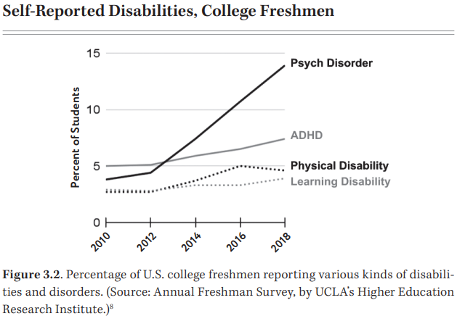
Section two closes with the author pushing for less “safetyism,” which he argues is an experience blocker. When parents and school leaders are focused on keeping kids safe from every little harm, they could be blocking them from learning experiences. Too many rules (e.g., illustrated by “tag rules” in Figure 3.10 from a public school in Berkley, CA) can lead to less experiences where children have to learn to deal with stress and anxiety. They can also strip away the creative abilities children should be developing. A few guardrails are a good idea, but too many lead to children who become coddled adults unable to handle even the smallest of challenges they will face in the grown-up world.

Haid finishes the section by arguing, “Smartphones are a second kind of experience blocker [safetyism is the first]. Once they enter a child’s life, they push out or reduce all other forms of non-phone-based experience, which is the kind that their experience-expectant brains most need.“[xv] Between 2010 and 2015, a significant rewiring occurred, and much of it was due to a shift from a discover mode to a defender mode mindset. Haidt argues that the coddling of the American mind had begun, and this was not the children’s fault, but of their parents.
Part 3 | The Rise of a Phone-Based Childhood
Part three centers on evidence of harm from the significant rewiring. Haidt argues there are four foundational harms that have been birthed out of the phone-based childhood. These harms include:
- Social deprivation
- Sleep deprivation
- Attention fragmentation
- Addiction
Most people, whether parents or not, can see the truth in these four problems. People, whether children or adults, who spend too much time on social media are going to be deprived socially, sleep less, be less attentive, and in extreme cases, become addicted (this is especially true regarding porn).
Anecdotes can be helpful, but data is still king, and Haidt brings the receipts in this section of the book with plenty of evidence to back up what most of us already know.
“In God we trust, all others must bring data.”
Source unknown, but often attributed to W. Edwards Deming
In this part of the book, Haidt lays out a series of characteristics that I found helpful in defining social media. They include user profiles, user-generated content, networking (e.g., becoming “friends” with others), and interactivity (e.g., likes, shares, and comments). These descriptors fit platforms such as Facebook, Instagram, X, Snapchat, TikTok, Reddit, and LinkedIn. He also includes YouTube; however, YouTube is seen more as a video library site and less for its social features.
Haidt suggests something changed around 2010 when Facebook introduced the “like” button, and Twitter allowed users to “retweet” posts. He argues, “These innovations quantified the success of every post and incentivized users to craft each post for maximum spread.” The author goes on to write, “At the same time, Facebook began using algorithmically curated news feeds. . .[to] curate content that would most successfully hook users.“[xvi]
For example, this is why you’re never likely to see anything positive about President Biden if you like Trump positive posts and vice versa. The algorithm furthers your belief and bias toward what you like and believe to be true. You never get “fed” alternative opinions so yours remains the same. One could argue this is one reason we are such a polarized nation.
“A fool takes no pleasure in understanding, but only in expressing his opinion.”
Proverbs 18:2
Suggestion: What Facebook and other social media sites that “feed” your bias need is a “balanced view” feature users can turn on to get alternative opinions on topics, especially controversial topics such as politics, abortion, LGBTQ issuses, religion, etc.
I’m often quick to point out that the most valuable thing God has blessed each of us with is not money or even family. The most valuable thing is time. We all have 24 hours each day, regardless of whether we have wealth and/or family. Time equates to opportunity, and opportunity can be lost if we don’t use it well. Haidt points this out in staggering terms as it relates to social media.
For example, preteens spend around 40 hours a week looking at screens for leisure activities (i.e., non-educational). Teens spend nearly 50 hours. Pew Research reports that a third of teens say they’re on one of the major social media sites “almost constantly.” Doing the math that equates to 16 hours a day – 112 hours per week. That’s what I’d call a major lost opportunity!
“The cost of a thing is the amount of . . . life which is required to be exchanged for it, immediately or in the long run” Henry David Thoreau.[xvii]
Two words that describe this phenomenon are “social labor.” Haidt discusses why so much time is spent online. It’s FOMO, “fear of missing out.” He writes, “The work is often joyless, yet many feel compelled to do it, lest they ‘miss out’ on something or be excluded. Eventually, for many, it becomes a mindless habit, something they turn to dozens of times each day.“[xviii] A mindless habit. This is so true. Children and adults with smartphones are too often caught in a mindless habit – a habit that requires no thinking and frequently leads to little learning.
Additionally, Haidt cites research that states the numbers vary by social class and race, which I found surprising. Lower-income families spend more time online, and Black and Latinos are online more than Asians and White families. This is also true of LGBTQ youth, which could be a reason why over 20% of Gen Z identify as LGBTQ, especially those who identify as transgender – something one prominent author describes as a “social contagion.”
“How do we consume as much of your time and conscious attention as possible? Sean Parker, first president of Facebook in 2017 interview.[xix]
What’s the harm? The first harm Haidt points out is something I’ve already discussed above – social deprivation. Kids are spending far less time with other kids. Social media, argues Haidt, is creating more social distance between children. He points to research done by Jean Twenge, which shows that teens who spend time in person with other teens (e.g., playing sports or in religious communities) have better mental health than those spending lots of time on social media.
The second harm is that kids are getting less sleep than they did before smartphones came into existence. Figure 5.2 shows a sharp uptick in teens with less than 7 hours of sleep. This lack of sleep, combined with critical brain development, is a toxic mix that can lead to several problems.
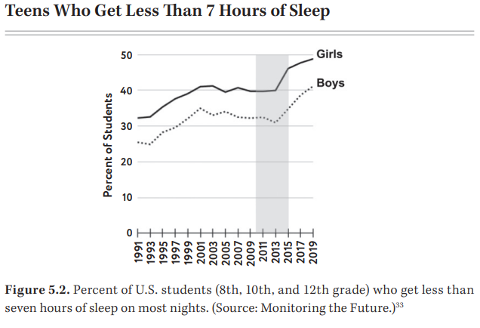
Furthermore, research shows that children (and adults) need adequate sleep to maintain good attention, which leads to the third harm created by social media: attention fragmentation. Haidt writes, “Smartphones are kryptonite for attention.“[xx]
Finally, addiction is the fourth and most serious harm caused by smartphones and social media. Research on animals is conclusive that rewarding them based on a “variable-ratio schedule” (i.e., providing rewards on a schedule that is not predictable) leads to the strongest and most persistent behavior. This behavior can be seen by anyone who posts to social media and constantly checks for “likes” and “shares.” We, children and adults, similar to animals, like (no pun intended) rewards, and will keep checking for them when they’re not automatically coming our way.
Girls, Boys, and Social Media
As the father of two girls, I found chapter six of particular interest. The title of this chapter is, Why Social Media Harms Girls More Than Boys. Haidt writes, “There is a clear, consistent, and sizable link between heavy social media use and mental illness for girls, but that relationship gets buried or minimized in studies and literature reviews that look at all digital activities for all teens.“[xxi] Later I’ll share what the critics say about Haidt’s claim, but for now look at Figure 6.2 that followed 19,000 children born in 2000 as they matured into adolescence.

There is a more significant relationship between time spent on social media and the likelihood of depression for girls. Those girls who spend five plus hours on social media are three times as likely to be depressed than those who reported they spend no time on social media.
Furthermore, girls are more likely to become social media “super-users.” Haidt reports that by 2015, one in seven girls had reached this level of social media usage.
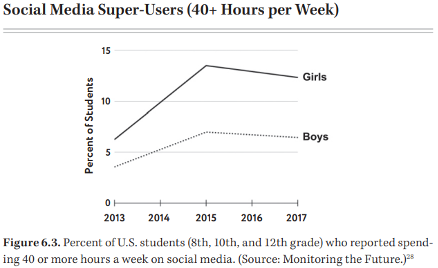
For adolescent girls social standing is often tied to their beauty and sex appeal. As you can see in Figure 6.4, what you see online is not a true representation of reality.

The problems with spending massive amounts of time on social media negatively affect not only girls but also boys. Neither are as satisfied with themselves as they were before the great rewiring in 2010, as illustrated in Figure 6.5.
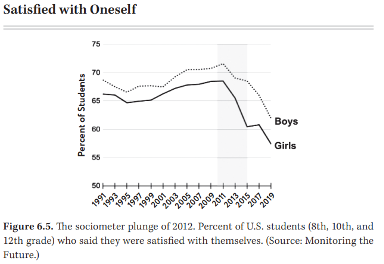
Furthermore, both boys and girls feel lonely more than they ever have, as shown in Figure 6.7.
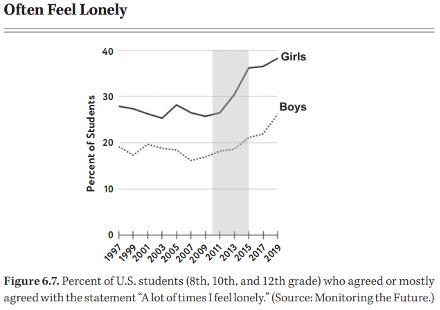
This leads to a not-so-surprising conclusion that neither boys nor girls feel they have a chance for a successful life, as displayed in Figure 7.1.
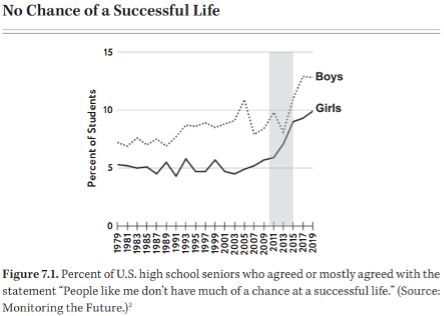
Finally, nearly one in five girls and boys feel that life is meaningless. I’ll discuss this more in the final section of this essay, but in essence it would appear many children see no meaning in life, hence it is meaningless. I will later argue this has much to do with the worldview of most children.
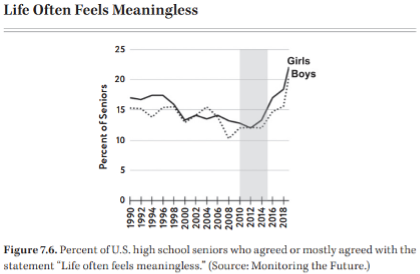
Finally, before I end this section, I want to share my thoughts on the chapter I was most looking forward to reading. This chapter Haidt titled, Spiritual Elevation and Degradation. The author begins by writing, “The phone-based life produces spiritual degradation, not just in adolescents, but in all of us.“[xxii] This leads to the question – what does “spiritual” mean?
Spiritual is a word that’s been redefined recently, and Haidt suggests spiritual means to live a life of morality. He suggests that Christians should ask, “What would Jesus do?” Secular people should create their own “moral” example. This is where he also points out that he’s an atheist. He writes, “I am an atheist, but I find that I sometimes need words and concepts from religion to understand the experience of life as a human being.“[xxiii] I find this statement so telling about the weakness of atheism. What atheists such as Haidt are actually saying is they cannot make sense of the world (this is what a worldview does) without “stealing” words and concepts from other worldviews (e.g., Christianity).
In other words, atheism has nothing to offer in making sense of the world. If atheism is true, then there’s no point in attempting to make sense of the world because life has no meaning, value, or purpose. We’re born, we die and are quickly forgotten. If you don’t believe this take a second to think about your great great great grandfather. What was his name? Where did he live? What did he do for a living? If you’re like most people, myself included, you can’t even answer the first question. In just a few generations we will all mostly be forgotten. All that we do will have little to no impact on those who follow us. As philosopher and apologist William Lane Craig points out, life is just a purposeless rush toward oblivion, if God does not exist.
Moreover, the data suggesting life often feels meaningless (Figure 7.6) didn’t surprise me because more young people are identifying as atheist, and if atheism is true, life IS meaningless.
Barna describes Gen Z as, “The first truly ‘post-Christian’ generation.“[xxiv] They report the percentage of Gen Z’ers who identify as atheists is double the US adult population (13% vs. 6%).
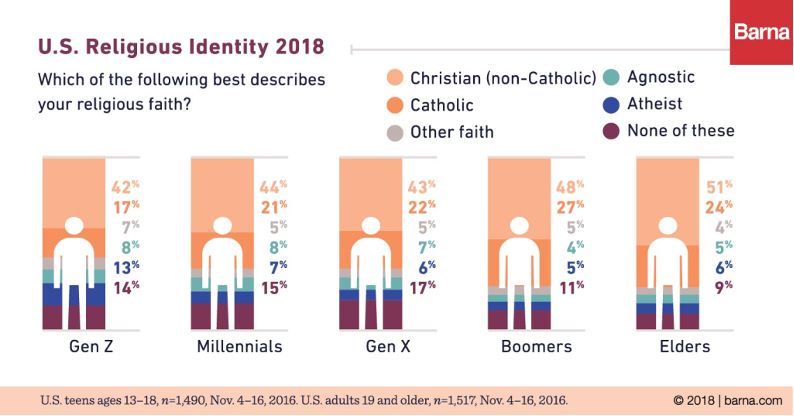
Summarizing this chapter, Haidt “draws on wisdom from ancient traditions and modern psychology to try to make sense of how the phone-based life affects people spiritually by blocking or counteracting . . . spiritual practices.”[xxv] His argument points to research suggesting that certain spiritual practices improve well-being and that smartphones and social media interfere with these benefits.
Part 4 | Now what?
The final section of the book is where rubber meets the road with practical ideas to address the problem defined in the first three sections. I noted the four recommendations at the beginning of this essay, but as a reminder here they are once again.
- No smartphones before high school.
- No social media before 16.
- Phone free schools.
- Far more unsupervised play and childhood independence.
Before he dives into the recommendations he makes a valid point, especially if your children are educated in government or privately run institutions. Haidt argues for “collective action” as a premise to implementing the four recommendations.
Parents need to work with other parents to reduce the problem with fitting in previously discussed. The only way your child will not feel left out is if the children around them are holding to the recommendations Haidt provides. This, I would argue, will be incredibly difficult, especially in larger schools. If you’ve ever tried to organize anything that involves parents and children doing the same thing you’ll know just how challenging this could be.
Furthermore, Haidt suggests government intervention to raise the age (it’s now 13) to create a social media account. More robust validation systems are also needed to determine whether the person signing up for the account is truly of age. As of now, anyone can say they are old enough, and no real validation is done. Haidt argues the minimum age of “Internet adulthood” should be 16.
Next, he lobbies for phone-free schools, where children lock their phones away during the school day to prevent them from distracting them in the classroom. This, again, would require major intervention by school officials and even overprotective parents who say they want to be in constant contact with their children.
Finally, he recommends kids be given more free play to do as they want (within reason) with minimal supervision. Earlier in the book he suggests this is one of the reasons why we’re facing such a big problem with smartphones and social media. Parents need to take two steps back and allow their children to learn, make mistakes, get a boo-boo or two, and work things out amongst themselves when conflict arises.
The Critics | Correlation is NOT Causation
The more popular you are, the more likely critics will emerge and take aim at your work, and Haidt’s writing is no exception. A recent WSJ article summarizes some of the pushback Haidt has received. Much of the criticism is related to the research Haidt uses to come to his conclusion that smartphones and social media are to blame for the problems. In short, the critics point out that correlation does not mean causation. For you non-statistic types, this simply means just because two or more things go up or down together (e.g., social media use and depression) doesn’t mean one is caused by the other (for example).
In a recent podcast discussion, Haidt emphasized the importance of distinguishing between studies that show correlation and those that show causation. Aaron Brown, a former Wall Street trader who currently teaches statistics and math at several universities, disagreed with Haidt during a debate on “The Reason” podcast. Brown pointed out that out of the 476 studies in Haidt’s book, only 22 include data on significant social media use or adolescent mental health issues, and none of them cover both aspects.
Candice L. Odgers, a psychology professor and associate dean for research at the University of California, Irvine, provided a critique of “The Anxious Generation” in the academic journal, Nature. Odgers expressed that the book’s emphasis on digital technologies rewiring children’s brains and causing mental illness is not supported by science. She suggested that the focus on social media as the cause of the mental-health crisis in young people might divert attention from the real underlying factors, such as genetic and environmental influences like gun violence and economic hardship.
I’m an expert in statistical analysis, but not having access to the raw data, it’s hard for me to determine the validity of these claims. However, regardless of the r-squared values, p-values, and correlation coefficients, one can hardly deny that looking at Facebook posts and TikTok videos on a smartphone for 40 – 100 hours a week is not helpful to developing minds.
Parting Thoughts | The Only Influencer to Follow
I conclude this essay with my final thoughts on the book and the problems our children face growing up in the 21st century. It’s been said that, “A problem well stated is half solved.“[xxvi] I’ll work to first define what I will argue is the problem before moving on to the causes and solutions; however, first, I need to ask you a question:
What should be the number one goal for parents, especially Christian parents?
Some might say, “Raising good children.” At first glance, I would agree that I want to have “good” children. However, I’d rather have children who become “great” adults. Parents need to start with the end in mind. Children won’t be children forever, so fathers and mothers need to focus on what they can do in the brief time of childhood that will have a lasting impact on adulthood.
“Train up a child in the way he should go; even when he is old he will not depart from it” Proverbs 22:6.
However, a few shocking numbers need to be reviewed before we dive into how to do this. Barna research reports less than 1% of 13 – 14 year olds have a biblical worldview (see Footnote 1 for definition of biblical worldview), and by the age of 13 a person’s worldview is mainly set. This statistic leads to another from the Cultural Research Center at Arizona Christian University that reports two out of every three adults under the age of 40 (67%) say they are still trying to figure out the meaning and purpose in their lives. Children who struggle with life’s meaning (see Figure 7.6 above) become adults who also struggle.
Haidt writes about this struggle.[xxvii] He references French philosopher Blaise Pascal who wrote (loosely paraphrased), “There is a God-shaped hole in every human heart.“[xxviii] This is another way of saying many people yearn for something beyond themselves; we have a natural desire to seek God, and when we don’t, something in our lives is missing.
Atheist turned Christian apologist C.S. Lewis summarizes this desire quite well: “If we find ourselves with a desire that nothing in this world can satisfy, the most probable explanation is that we were made for another world.“[xxix]
Furthermore, I would argue that the older one gets, the more this “hole” becomes apparent if it’s not correctly filled. Haidt writes, “There is a hole, an emptiness in us all, that we strive to fill. If it doesn’t get filled with something noble and elevated, modern society will quickly pump it full of garbage.“[xxx] This truism is ever so true regarding our children. They are going to “follow” and be “influenced” by someone. You, as a parent, play a key role in who these people will be.
So, the question is, are you, parent, ready to take action in helping determine who your children are influenced by and whom they follow? This seems like an obvious and easy “yes,” but I would argue many parents are struggling with the same problem as their children – a selfish nature driven by our own desires to put what we want in life ahead of all others.
One of the greatest lessons I’ve learned as a parent is how selfish I am. This selfishness becomes apparent early on when your child, especially the first child, can do nothing for themselves. They have to come first or they won’t survive! However, as they get older and can do things for themselves it’s easy to move back into a selfish mode of life.
Don’t get me wrong—some good can come from this in that children begin to learn how to be increasingly self-sufficient. However, it’s all too easy to shove a screen in your child’s face when you want to do what you want to do. I’ve been there and done that.
As Haidt suggests, “Social media keeps the focus on the self, self-presentation, branding, and social standing. It is almost perfectly designed to prevent self-transcendence [rising above the self and relating to that which is greater than self].”[xxxi] This phenomena is why social media is such a perfect match for who we naturally are – selfish, ego-driven, conceited beings.
The good news is that once we come to terms with who we truly are, we can take action to change. Furthermore, we can also help our children do the same. Now, going back to my initial question to you regarding our goal as Christian parents, a more complete and accurate answer is that we are to become disciples and make disciples.
“Fathers, do not provoke your children to anger, but bring them up in the discipline and instruction of the Lord” Ephesians 6:4.
Christ Jesus may not have been clear on all that he said (e.g., Jesus rarely gave a “yes” or “no” answer to any question—one, if not the only, Christ-like characteristic contemporary politicians possess). But one thing he clearly described for us is what makes one a disciple of his. Each of the synoptic gospels records Christ’s description of a disciple.
“Then Jesus told his disciples, “If anyone would come after me, let him deny himself and take up his cross and follow me” Matthew 16:24 (see also, Mark 8:34; Luke 9:23)
Do you see the three criteria to become a disciple in Scripture? If Jesus were giving a PowerPoint presentation on becoming a disciple he could sum it up in three bullet points:
- Deny yourself
- Take up your cross
- Follow me
I’ll finish this essay with a quick look at each of these disciple traits and how you can live them out and help your children to do the same. In doing so you will be taking the first step in helping your children move from “me-ology” to “theology.” This is the answer to transforming the Anxious Generation into the Christ-Centered Generation.
“Theology is the study of God. It is the examination of his attributes and abilities, his goodness and faithfulness, who he is and what he has done. Theology is substantial, true, and life-giving. Feasting here will allow us to grow stronger and more into the image of him who made us. Me-ology is frail, precarious, and dependent on you and me who grow tired and weary and make mistakes. Meology is only as good as we are. And we never feel quite smart enough, or disciplined enough, or pretty enough, or energetic enough, or whatever enough. Me-ology prizes you and me. Theology prizes the God of the universe who holds everything together” Jen Oshman.[xxxii]
- Deny Yourself
To deny yourself means you don’t take top priority in your life, Christ does. This is what it means to make Jesus Christ Lord of your life. We naturally want to rule our own lives; do what we want to do; and make our own decisions. The great news is God has given us free will to do all of these. The bad news is we often make mistakes because our sinful natures often want the opposite of what God wants for us until we make a decision to follow Christ and pledge our allegiance toward him and become a new creation (2 Cor. 5:17). To deny yourself means you identify Christ Jesus your first and foremost “Influencer.“
- Take up Your Cross
When you deny yourself and commit your allegiance to Christ, he knows it will lead to persecution; this is what is meant by taking up your cross. The cross was a torture device, and those who heard Jesus speak about it knew he was telling them they should expect to be persecuted. We have good evidence that many of the apostles died excruciating deaths for taking up their cross. Praise God, we are blessed today in the USA that no crosses are being setup (not yet anyway) to hang Christians from.
However, I can say with near certainty if you take a stand against any of the social ills (e.g., abortion, same-sex “marriage”, LGBTQ topics, etc.) plaguing society and the Church today and bring the name of Christ into the conversation you can expect to be persecuted, if not physically most certainly verbally.
- Follow Me
There is only one person you need to be “following,” the man Christ Jesus. And if you follow Christ and live out his commands in your daily life, your children will take notice. They will be following you, and this is where the “creating disciples” process begins. As the popular adage goes, “More is caught than taught.“
If you’re looking for a Scripture to remind you of what you need to do in following Christ, consider 1 John 2:4-6,
“Whoever says ‘I know him’ but does not keep his commandments is a liar, and the truth is not in him, but whoever keeps his word, in him truly the love of God is perfected. By this we may know that we are in him: whoever says he abides in him ought to walk in the same way in which he walked.”
Walk daily with and like Christ and there is a good chance your children will too.
One final thought. First, I highly recommend Haidt’s book. His writing is insightful, balanced, and thought provoking. Below I’ve also included some links to helpful documents he’s provided to help parents raising children during these anxious times.
Additionally, I’d suggest reading George Barna’s book, Raising Spiritual Champions that makes for an excellent Christian complementary text to Haidt’s book. I’ll leave you with Barna’s challenging, yet truthful advice for Christian parents in the 21st century.
“Backbone required. . .The solution is for you [parents] to step up and take control of the media [social media, TV, etc.] that gets exposure in your house. If you fail to do so, three decades-worth of data persuasively argue that you will fail in your hope of raising a spiritual champion [disciple of Christ]. You will be inviting the reigning culture to raise your child for you” George Barna.[xxxiii]
In other words, if you don’t do it, someone else will.
Some helpful links to additional information from the author.
References:
[1] Jeff V. Cook, Seven: The Deadly Sins and the Beatitudes (Grand Rapids, MI: Zondervan, 2008), 34.
[ii] https://jonathanhaidt.com/bio/
[iii] Jonathan Haidt, The Anxious Generation (New York: Example Press, 2023), 9.
[iv] I use George Barna’s definition of a biblical worldview as consisting of believing 1) there is one God. He created the world, 2) All of us have sinned and we need to repent, 3) Jesus’ death pays for our sins, 4) The Bible is true, 5) God defines what is true, 6) LIfe’s purpose is to know, love, and serve God, and 7) Success in life is consistent obedience to God.
[v] Carl Trueman, The Rise and Triumph of the Modern Self: Cultural Amnesia, Expressive Individualism, and the Road to Sexual Revolution (Wheaton, IL: Crossway, 2020), 30.
[vi] Ibid., 222
[vii] John Taylor Gatto, Dumbing Us Down: The Hidden Curriculum of Compulsory Schooling, 25th Anniversary ed. (Gabriola Island, BC: New Society Publishers, 2017), 22.
[viii] Joel Osteen, Your Best Life Now (Nashville: Faithwords, 2015).
[ix] https://www.pewresearch.org/internet/2022/08/10/teens-social-media-and-technology-2022/
[x] Ibid., 35-36.
[xi] Ibid., 53.
[xii] Ibid., 59.
[xiii] Ibid., 62.
[xiv] Ibid., 81-82.
[xv] Ibid., 109.
[xvi] Ibid., 117.
[xvii] Henry David Thoreau, Walden; or, Life in the Woods (Boston: Ticknor and Fields, 1854), 39.
[xviii] Ibid., 58.
[xix] https://www.axios.com/2017/12/15/sean-parker-facebook-was-designed-to-exploit-human-vulnerability-1513306782
[xx] Ibid., 140.
[xxi] Ibid., 146.
[xxii] Ibid., 199.
[xxiii] Ibid., 201.
[xxiv] https://www.barna.com/research/atheism-doubles-among-generation-z/
[xxv] Ibid., 202.
[xxvi] This quote is often attributed to Charles Kettering, who was head of research at General Motors from 1920 to 1947.
[xxvii] Although Haidt writes about a “God-shaped hole,” he wrongly attributes the hole to evolution, suggesting that “Natural selection might have carved out [the] hole.” However, he suggests that his “religious” friends attribute the hole to a longing for a Creator. While I disagree with his evolutionary/atheist assessment I do applaud him on his balanced approach to writing on the topic.
[xxviii] Blaise Pascal, Pensées, trans. A. J. Krailsheimer (London: Penguin Books, 1995), 75.
[xxix] C.S. Lewis, Mere Christianity (New York: HarperOne, 2001), 136.
[xxx] Ibid., 216.
[xxxi] Ibid., 217.
[xxxii] https://www.crossway.org/articles/make-a-change-from-me-ology-to-theology/
[xxxiii] George Barna, Raising Spiritual Giants: Parenting Kids with Purpose, Passion, and Power (Ventura, CA: Regal Books, 2003), 180.
Recommended Resources:
Jesus vs. The Culture by Dr. Frank Turek DVD, Mp4 Download, and Mp3
Counter Culture Christian: Is the Bible True? by Frank Turek (Mp3), (Mp4), and (DVD)
If God, Why Evil? (DVD Set), (MP3 Set), and (mp4 Download Set) by Frank Turek
Your Most Important Thinking Skill by Dr. Frank Turek DVD, (mp4) download
Scott Thor is a disciple of Christ, a dedicated husband, and a homeschooling father of two daughters. He is passionate about educating Christians to defend their faith with gentleness and respect, as encouraged in 1 Peter 3:15. Currently, Scott is pursuing a master’s degree in Christian Apologetics at Biola University. Prior to becoming a full-time homeschool dad, he spent 20 years in various roles as an engineer, manager, and executive vice president, consulting for several Fortune 500 clients, including Boeing, Chevron, and Harley Davidson. Despite initially struggling academically—having flunked the 7th grade—Scott discovered the value and purpose in learning, ultimately earning a doctoral degree in management from George Fox University, an MBA from the University of Sioux Falls, and a BS from the University of Nebraska.
Originally posted at: https://bit.ly/46lWVBk































